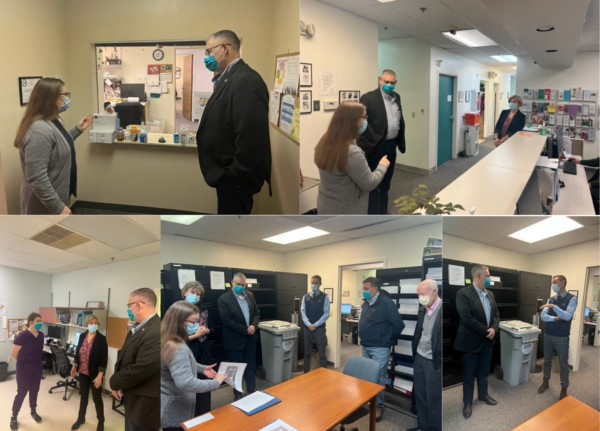
|
||||
|
In this Update:
Governor’s Budget Proposal Includes Significant Areas of Concern
Gov. Josh Shapiro started the 2023-24 state budget process this week with the introduction of his spending plan, which contains some significant areas of concern. While the governor’s support for Senate Republican priorities such as workforce development, infrastructure advancement, safe communities and mental/behavioral health are appreciated, the plan still boosts state government spending to unsustainable levels. The $45.8 billion plan seeks to boost state spending by more than $1.3 billion above the current year’s budget and would almost completely deplete the state’s Rainy Day Fund by 2028. In addition to the many spending proposals, the budget includes no indication the governor will remove Pennsylvania from the Regional Greenhouse Gas Initiative (RGGI), which will burden all Pennsylvanians with an annual tax on electricity of nearly $670 million that consumers, including those on fixed incomes will have to endure. This is just the beginning of the budget process. The Senate Appropriations Committee will begin a series of public hearings on the proposal March 20, after which work will continue to create a final spending plan. I will work with my colleagues to enact a responsible budget that respects taxpayers and funds essential services by the June 30 constitutional deadline. Historic Breast Cancer Screening Bill Unanimously Passes Senate
The Senate unanimously passed Senate Bill 8, a comprehensive breast cancer screening and genetic testing bill. The bill now heads to the House of Representatives for consideration. The bill eliminates out-of-pocket costs associated with BRCA-related genetic testing and counseling, as well as supplemental screening such as breast MRIs and ultrasound for women at high-risk. High-risk conditions covered by the bill include dense breast tissue, a personal or family history of breast cancer, genetic predisposition and prior radiation therapy. The legislation expands on Act 52 of 2020, which required insurers to cover breast MRIs and ultrasounds for women with high-risk factors. Senate Bill 8 is step two, eliminating costs including co-pays, deductibles or co-insurance for those screenings and BRCA-related genetic testing and counseling. Visit to State College’s Centre Volunteers in Medicine
During a recent visit to State College’s Centre Volunteers in Medicine (CVIM), I had the opportunity to speak with CVIM Executive Director Cheryl White, staff and board members about all the services they offer, for free, to residents of Centre County. You can learn more about the various services offered at CVIM here. These folks are dedicated to their mission of helping those who have been suffering a lack of health care. That lack has been caused, in large part, by government interference in the health care system. Though the patients of CVIM never pay a penny, their healthcare services are not free to provide. A gift to CVIM is an investment in the community. Each dollar contributed to CVIM turns into three dollars of value. You can learn how you can donate to CVIM here. Centre County Free Health Care Clinic March 25-26 at Penns Valley Elementary School
Senate Acts to Protect Citizen Data with State Employee TikTok Ban
The Senate approved legislation to shield citizen data from unauthorized access by prohibiting state-owned devices and networks from downloading and using TikTok. The bill now advances to the House of Representatives for consideration. Pennsylvania state government holds sensitive information in the form of birth certificates, driver’s licenses, occupation certificates, taxes and more. Senate Bill 379 would mandate that all state agencies, departments and commissions remove the application from state networks. It would also require that policies are put in place to block application installation, as well as network-based restrictions to prevent its use and access. Across the nation, both Democrats and Republicans have voiced growing concerns about the security and potential manipulation of the popular social media app TikTok. At least 29 states have addressed the risk to government systems posed by TikTok, and Congress prohibited its use across a wide array of federal agencies and departments. Measure Preserving Community Energy Choice Passed by Senate
Legislation ensuring that state residents have options when it comes to fuel availability was approved by the Senate. The bill now heads to the House of Representatives for consideration. Senate Bill 143, known as Energy Choice legislation, would prevent municipal entities from banning a specific type of fuel source for appliances and heating homes or businesses. The measure was developed after cities across the nation took steps to ban fuels, such as natural gas and heating oil, in newly constructed buildings. The legislation is an important component of a sound energy policy for Pennsylvania that’s inclusive of all energy options residents may want or need to access. Senate Approves Legislation to Increase PA National Guard Health Care Providers
The Senate approved legislation that would allow more health professionals to participate in the Medical Officer Health Incentive Program, helping to ease the shortage of medical specialists in the Pennsylvania National Guard. The Medical Officer or Health Officer Incentive Program was created in 2014 to provide a tuition reimbursement incentive to those who qualified through their time in the armed services. Even though the program was successful in attracting health care providers into National Guard service, some health professionals, like dentists and physician assistants, were inadvertently left out of the program. Senate Bill 162, which fixes that oversight, now heads to the state House of Representatives for consideration. Senate Honors 20th Anniversary of Operation Iraqi Freedom
The Senate marked the upcoming 20th anniversary of Operation Iraqi Freedom with a resolution this week. In 2003, the United States and coalition forces began the mission to liberate Iraq from dictator Saddam Hussein and extend freedom and democracy throughout the region. On March 20, 2003, the beginning of Operation Iraqi Freedom was marked with airstrikes on Saddam Hussein’s presidential palace. Senators Pennycuick, Robinson, Aument, Mastriano and I are all veterans of that conflict and currently serve in the Senate. Operation Iraqi Freedom ended on Dec. 15, 2011. Annual Liquid Fuels Distribution to Municipalities to Support Local Roads and Bridges
Fixing and maintaining Pennsylvania’s roads, highways and bridges remains a top priority. To that end, $470.2 million in liquid fuels payments – a 3% increase compared to last year – will be distributed by the Pennsylvania Department of Transportation to help certified municipalities maintain their roads and bridges. PennDOT’s annual distributions assist with municipalities’ highway and bridge-related expenses such as snow removal and road repaving. The formula that determines the allocation a municipality will receive is based on its population and miles of locally owned roads. To be eligible for liquid fuels, a roadway must be formally adopted as a public street by the municipality, meet certain dimension requirements and be able to safely accommodate vehicles driving at least 15 mph. You can view the complete list of municipal liquid fuel payments here. PA Game Commission Asks Public to Report ‘Tame’ Grouse Sightings
The Pennsylvania Game Commission is seeking the public’s help in understanding the state’s grouse population. The agency – charged with perpetuating wildlife species including grouse over the long term – is conducting a ruffed grouse genetics study in cooperation with Pennsylvania State University. The research aims to determine whether Pennsylvania’s grouse population shows signs of splitting up into distinct subpopulations and if “tame” behavior – meaning they show little fear of or even act aggressively toward people, especially in spring and fall – is linked to genetics. The results of this study will ensure habitat management efforts are targeted to improve and maintain grouse population connectivity. A #WildSciPA video available on the Game Commission’s YouTube channel shows just what that looks like. Pennsylvanians are encouraged to report the location of any “tame” grouse they see this spring by sending an email to grousecomments@pa.gov. That email should include the person’s name and phone number, date of the sighting, location of the encounter and a description of the grouse’s behavior. Game Commission staff may reach out to those who report encounters for additional information, if necessary. Field staff will then visit those locations where “tame” grouse sightings occurred to capture birds and collect a genetic sample from each. All grouse from which samples are taken will be released immediately afterward at the same sites they were captured. The more birds the Game Commission can sample, the better, so public participation will be important to the success of the project. Daylight Saving Time Begins This Weekend
Reminder: Daylight Saving Time begins this Sunday, March 12, at 2 a.m. While cell phone and computer clocks usually change automatically, most people move their standard clocks ahead one hour on Saturday night. It’s also a good time to check smoke alarms and carbon monoxide detectors. If the devices are older than 10 years, experts suggest upgrading to 10-year, sealed battery alarms. They don’t require any battery replacement throughout their lifetime. Regardless, it’s still a good idea to press the test button on the alarms at least once every month.
For anyone who hasn’t already signed up to receive my mission reports, you can get on the e-newsletter mailing list here. |
||||
|
||||


2024 © Senate of Pennsylvania | https://senatordush.com | Privacy Policy |











